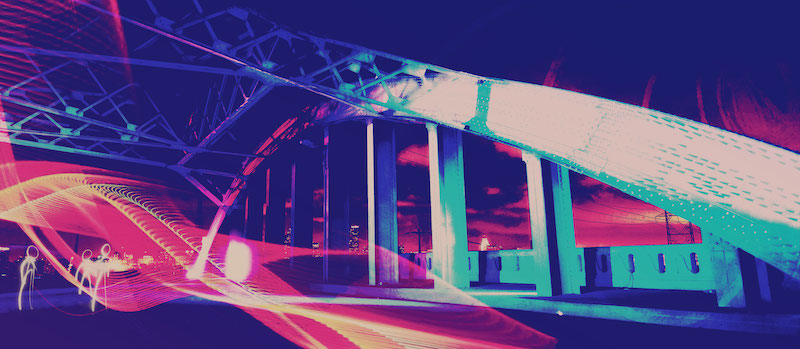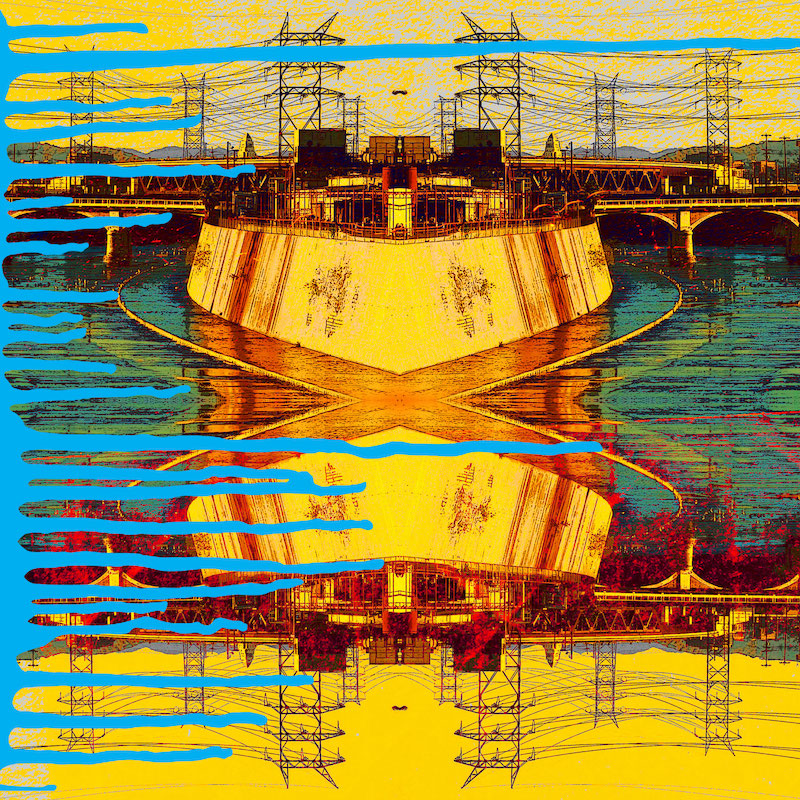
River LA, the organization tasked with revitalizing the Los Angeles River, is sharing stories of the 51-mile waterway through multiple mediums, exploring its past, present, and future all at once. Experiences unfold both in real life, at its banks, and through a system of digital tributaries that allow the viewer to choose their own narrative path. Not to mention, Rio Reveals is a fundraiser for a nonprofit that’s also putting over 40 artists to work in a pandemic, which is pretty special all on its own.
For River LA board member and project lead Krisztina “Z” Holly, Rio Reveals isn’t simply a fundraising campaign, however. They’re not just raising money, but awareness.
“Less than 10 years ago, when I first started getting involved with [River LA], my friends were like, ‘What’s that? L.A. has a river?’ And now people are starting to hear about it, but they don’t really know what is possible,” she said.
As Rio Reveals launches, so do the final stages of the Los Angeles River Master Plan. Per a release, the Master Plan will contain opportunities for open spaces, cultural centers, recreational amenities, and more along the river, which River LA seeks to co-create “with adjacent neighborhoods while addressing cultural, socioeconomic, and environmental challenges.”
It was shortly after Holly decided to come up with a COVID backup plan for the River LA’s fall fundraiser that mutual friends introduced her to 13Exp founder Mikhael Tara Garver. Garver is an experiential designer who’s worked with AMC and The National Park Service and served as one of first directors of immersive behemoth Sleep No More.
After years of bicoastal work, Garver moved to L.A. on January 1 to helm several large projects that are now, due to the pandemic, on hold. But if there’s any serendipity here, it’s that she had time to bring her expertise to Rio Reveals. With Garver’s credentials, we know it’ll be something unique.
Rio Reveals will take place in two stages. “Firefly Nights” is an in-person experience with live performances at the river. Guests will remain mostly in their cars, but may occasionally walk outside with their households. Donors can preview “Firefly Nights” in late October, with a larger release to follow.
“Rio Records” is a 70- to 80-minute online experience for 100 people per session that you can complete on your computer or, if you wish, on your phone while actually outside near the river. It features livestreamed performers, recorded content, and interactive moments. Some of it’s on Zoom, but a lot of it isn’t.
“Imagine you get an invitation from a woman from the future…who reaches out to you and says, ‘I am looking to collect all of the records of the river. There are so many stories, it’s endless, and part of tonight is you making, collecting, and building those records with me,'” Garver said.
From there, guests can use a map to follow the stories and characters they feel most drawn to, and more will reveal themselves as the night unfolds.
“You could follow a Best in Show docu-drama comedy. You could follow a young woman who is literally piecing together different fossils she’s started to uncover that are a part of putting together her family’s story,” Garver offered as examples.
Some guests will find themselves unraveling a mystery or privy to a romance. These diverse stories will highlight the river’s beauty as well as its complexity as they examine its impact on the shape and history of Los Angeles. “Rio Records” will also consider environmental, socioeconomic, and urban planning angles, presenting the river’s past and present alongside a possible future as a revitalized public resource.

At the end of the “Rio Records” experience, guests will receive a map of the river journey they chose, which they can then replicate in real life. It’s a way to connect with nature through narrative, then experience nature in a new way having had that experience.
“This idea of making the invisible visible means that you have more people appreciating it versus feeling like it’s a responsibility to appreciate it. And then, that’s how people start to care about things, right?” Garver said.
Current participating artists include choreographer and dancer Ana Maria Alvarez (Contra-Tiempo), actress Anna Lamadrid, writer Mary Angelica Molina, experiential producer Daniel Penilla, composer Jonathan Sanford, designer Shannon Scrofano, and sound designer Will Pickens. Due to the fluid nature of the project, many more artists may participate in the future as it evolves.
Garver’s immersive work has always been about that kind of sustainable storytelling. Pre-COVID, “immersive” pop-ups or Instagram factories opened nearly every week in Los Angeles. Some of them were provocative or told compelling stories, but many felt like cash grabs where people paid $40 to stand in front of a cute backdrop or next to a piece of plastic shaped like a giant chicken nugget.
“Experiential is a multi-billion dollar industry that was growing so fast. The hunger for the work grew before the people spending the money knew what the quality of the work was,” Garver said. “I’ve been at it for two decades, since the beginning, before we were calling it ‘experiential’ or ‘immersive.’ I’d get hired by a brand or a studio or a social justice organization, and we’d create these experiences. And I kept saying, experiential is not just a pop-up. It’s a larger system of stories that can live in a variety of ways. And if we don’t start looking at our field that way and investing in our field that way, we’re actually minimizing the power of what we’re building, A, and B, we’re going the way of theaters and movie theaters which are reliant on tickets sales.”
Occasionally, a brand or nonprofit would call Garver and ask for a party with an “experience.” They might not necessarily care so much about what that experience was, exactly, as long as it was “pretty.” But now, we don’t have parties. To get people to truly engage, we need characters and stories we care about, that make us curious enough that we leave our homes or don’t log off.
“No one’s going to leave their house anymore for an Instagram museum,” Garver said.
Garver believes Los Angeles could ultimatley be the epicenter of where experiential and immersive work evolves, and at the very least, she doubts she’ll ever need to sit in a post-COVID board room and emphasize the need for people to meanginfully come together with other humans. We know we need that now, more than ever.
The river is a good place to start. It already connects the Simi Hills to downtown L.A. to Long Beach, so why not gather round for a story or two that connects us to one another?
Rio Records will run for six weeks starting November 19. Tickets are available now, starting at $25.
advertisements
